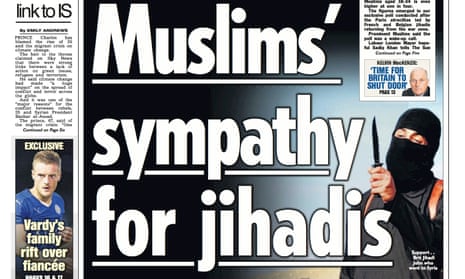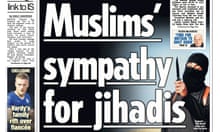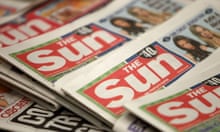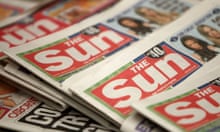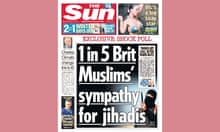The Sun is facing a backlash against its front-page report of an opinion poll purporting to show that one in five British Muslims had “sympathy for jihadis”, with more than 1,200 complaints made to the press regulator.
Readers and Muslim organisations accused the paper of misrepresenting the results of the poll, conducted by Survation, which showed that 5% of respondents agreed with the statement “I have a lot of sympathy with young Muslims who leave the UK to join fighters in Syria” and that 14.5% said they had “some sympathy”. Critics argued that the use of the term “sympathy” was ambiguous and that it was not clear who was meant by “fighters in Syria”.
The Independent Press Standards Organisation (Ipso) said it had received more than 1,200 complaints about the front page by 1pm on Tuesday, far more than for any story since the regulatory body was set up last year. Less than 48 hours after publication, the complaints dwarfed those made against a column by Katie Hopkins comparing migrants to cockroaches, which received 400 complaints over several weeks.
Dr Shuja Shafi, secretary general of the Muslim Council of Britain, one of Britain’s largest Islamic organisations, said: “Many Muslims will find this poll hard to believe.” He added that the vast majority of British Muslims abhorred terrorism.
“Poll after poll attests to this, as do the many surveys showing how almost all British Muslims would report someone from the Muslim community to the police if they knew they were planning an act of violence,” Shafi said.
“Of course, even one person harbouring sympathy for the Daesh [Isis] death cult is one too many. Terrorism is indeed a problem and many a British Muslim parent is worried whether their children may be lured to go off to the chaos in Syria.
“But dubious headlines, as that printed in the Sun, do not help matters. The grand strategy of Daesh is to divide our communities and stoke fear between communities. We should not play their game.”
Maajid Nawaz, the chairman of the Quilliam Foundation counter-extremism thinktank, tweeted: “In conclusion, the Sun has made it harder to have a vital conversation around worrying levels of support for Islamism. All for a cheap headline.”
Humza Yousaf, a minister in the Scottish government, said the article was “inflammatory, flawed and puts Muslims at risk of further abuse”.
Concerns have also been raised about the Sun and Survation’s methodology, after it was revealed that the poll was constructed by calling people with “Muslim surnames”. Survation said it had picked out likely respondents using the help of an academic expert on naming, a method that rival polling companies said did not necessarily amount to a representative sample of the British Muslim population.
Survation was approached by the Sun because the paper’s regular pollsters, YouGov, “didn’t want to do the poll”. YouGov said it did not want to carry out the study because it could not be confident that it could accurately represent the British Muslim population within the timeframe and budget set by the paper.
A YouGov spokesperson said: “To survey Britain’s Muslim population, particularly at a time of such heightened sensitivities, requires the kind of time, care and therefore cost that is beyond a newspaper’s budget.”
Adil Ray, the creator and star of the BBC1 sitcom Citizen Khan, and one of those called as part of the survey, said he felt that “every question was open to distortion”. He told the Guardian he didn’t want to take part in the poll but wanted to know what some of the questions were.
“With the ‘sympathy’ question I remember thinking ‘that’s such an odd question to ask’ and so easily misconstrued. Saying ‘no sympathy’ felt like the closest answer. What I wanted to say is that I had some understanding of why they chose to fight.”
Ray added: “The Sun has a great responsibility to do what it can to create a better understanding between us all. Not to further divide us. Surely the Sun, with its recent past, would do well to demonstrate some humanity in these difficult times.”
Ray said even the person who had called him agreed that the phrasing of a question about whether Muslims were responsible or not responsible for the lack of integration “wasn’t correct”.
Ben Page, the chief executive of pollsters Ipsos Mori, said: “The main issue with this poll is the reporting, which made it appear that one in five of those sampled supported Isis, when in fact they were expressing sympathy with people going to fight in Syria, as I understand it, which could of course include British ex-servicemen fighting against Isis with the Kurds, or anti-Assad Muslim forces who are also fighting against Isis.”
Other pollsters told the Guardian that it could require thousands of phone calls at a cost of tens of thousands of pounds to generate a statistically representative sample of the 2.7 million Muslims who live in the UK.
It cannot be determined how representative the Survation sample is because of a lack of various socioeconomic and demographic details. A similar poll conducted by Survation for Sky News in March showed a higher proportion of Muslims – 28% – showed at least some sympathy with young Muslims leaving the UK to join fighters in Syria. Non-Muslims were also polled, using the same word, and 14% agreed they had at least some sympathy with the statement.
A spokesperson for the Sun said: “Most of our survey, commissioned after the Paris atrocities, probed Muslim attitudes to IS [Isis] specifically. No one agreeing to the statement ‘I have a lot of sympathy with young Muslims who leave the UK to join fighters in Syria’ was in any doubt which fighters we meant.
“Some on the political left claim ours was a ‘rogue’ poll. In fact, the numbers expressing sympathy for jihadists were down on similar surveys by the BBC and Sky after January’s Charlie Hebdo massacre.”
Meanwhile, the hashtag #1in5Muslims began trending on Twitter, with many users making light of the poll’s results.
#1in5Muslims are lucky enough not to have a red squiggly line under their name in Microsoft Word
— Hamzah Moin (@hamzahmoin) November 24, 2015
#1in5Muslims use 'Inshallah' to politely avoid committing to any plan. (And it works.) "Wanna get coffee sometime?" "Sure, yeah, inshallah."
— Mehreen Kasana (@mehreenkasana) November 23, 2015
#1in5Muslims have forcefully converted their cat to islam pic.twitter.com/RCvwaqKuw6
— Anas (@Saka1410) November 23, 2015
#1in5muslims look like Zayn Malik, according to their mums.
— Sarkhaíl Khan (@Sarkhail7Khan) November 23, 2015
